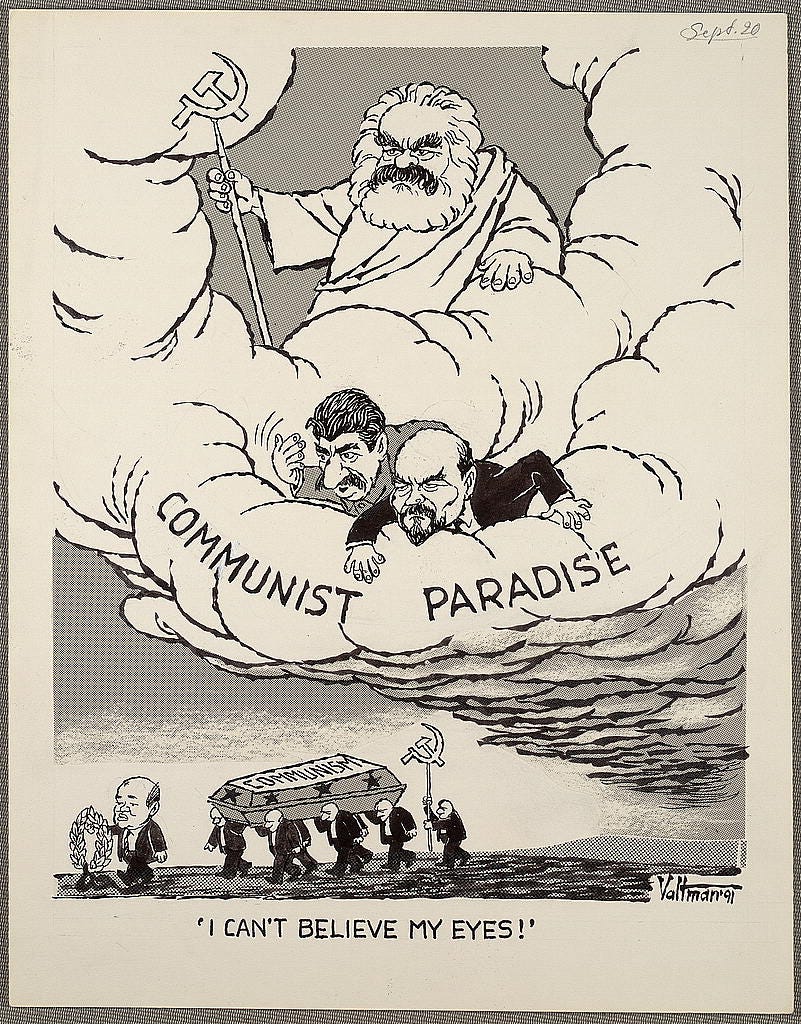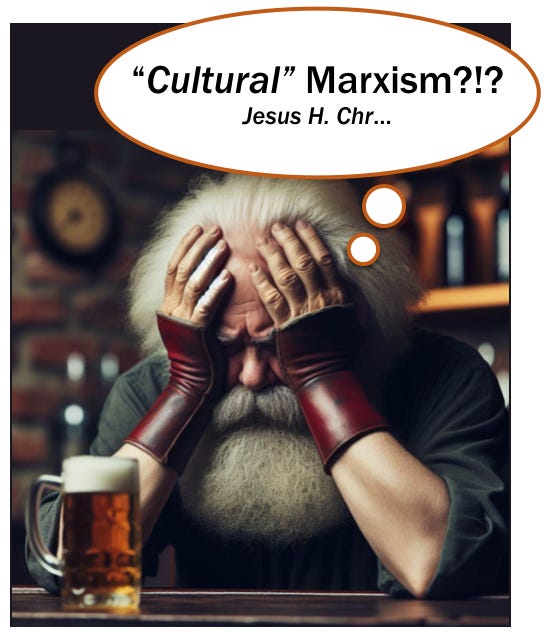*** Greta Thunberg and her recent cruise toward Gaza aboard the “selfie flotilla” reminded me of something I posted here more than a year ago when only a small handful of people were reading this Substack. Since then, hundreds of people have subscribed (for which I am eternally grateful; thank you all for being here!), so I wanted to share this essay again. It captures one of the main ideas that animates Out of Babel, a somewhat obsessive project that I tell my wife is cheaper than therapy. ***
I. Waking up the crowd
It’s early 1998, and I’m on the phone with Dr. Kent Weeks, an American Egyptologist, author, and the founder of a project to map every temple and tomb in the royal necropolis at Thebes.
Dr. Weeks has written our soon-to-be-published National Geographic cover story about Egypt’s Valley of the Kings. My assignment, as a magazine staffer, is to research and write captions for all the story’s maps and images.
Page by page, photo by photo, Dr. Weeks talks me through the layout, explaining the significance of each artifact, tomb, Pharaoh, and dynasty.
As our conversation comes to a close, I ask him a question that’s long puzzled me: Why does ancient Egypt capture more of the public’s attention than, say, the Mongol empire? or the Assyrian? or Mayan? or countless other empires that rose and then suddenly vanished from history?
Kent offers a few possible explanations — Egypt’s gold treasures are eye candy; spooky mummies; gigantic pyramids; the glamour and glory of imperial power — but his most compelling reason is this one:
“Whenever I give a public lecture,” he tells me, “and I fear I’m losing the audience’s attention, I’ll drop in a line like, ‘Some scholars think that this particular Pharaoh might be the one from the Bible — from the book of Exodus.’ And immediately people sit up straighter, their eyes brighten, and once again I have their undivided attention.”
We both laugh at his little gambit, not because it’s funny but because it’s true. Without the Moses vs. Pharaoh storyline, Dr. Weeks would simply be reciting names, facts, dates, and other historical trivia that pointed to itself and little else.
But when the same information is presented as part of a broader narrative that’s familiar to people in the audience — I know this story of slavery and liberation… I’ve read the Book… I’ve seen the movie! — then you’re not spouting trivia anymore. Instead, you’re describing the characters, plot, themes, conflict, and drama that animate the early chapters of The Greatest Story Ever Told.
“Storytelling reveals meaning without committing the error of defining it,” Hannah Arendt once wrote. For thousands of years, the Bible and its “connected narrative of history” have revealed deep meanings without defining them for billions of people.
This, I believe, is one of the Bible’s greatest miracles.
It’s also the miracle that brought Kent Weeks’ audience back to life.
II. Uyghurs are people, too
Whenever I talk about the Bible, Israel, or Jewish stuff with my friend Lauren, she is quick to remind me that our primary allegiance should be to the human race. “First,” she says, “we are people!”
If that’s true, then why does this happen?
Why is the chant “Free Palestine!” reverberating across the West right now, while the Uyghurs struggle to get a passing mention on page B17 of the newspaper?
Here’s one possible explanation: China’s persecution of the Uyghurs is a human rights disaster, but it’s not a conflict that fits into any broader or commonly recognized narrative framework. You could argue that Man’s Inhumanity to Man is the relevant story here, but when the same horrible things happen again and again… well, that’s almost the definition of a bad story.
The same is true for the current humanitarian disasters in Haiti, Ukraine, the Democratic Republic of the Congo, the Sahel, Mozambique, Myanmar, Syria, and Afghanistan; all are calamities that don’t easily fit inside any bigger, transcendent, or redemptive story. In most of those countries, it’s human suffering, all the way down.
But the Palestinians are in a very different category. They are intimately and tragically wrapped up in a Story that’s familiar to most people in the Western world. Now the question is: How do we — Israelis and Palestinians; Jews, Christians, and Muslims — get out of this bloody and seemingly hopeless narrative rut?
III. Israel, Palestine, and the stories we live by
In 1987, when Tom Friedman was the Jerusalem bureau chief for The New York Times (and before he became better known for being wrong about everything), he wrote a wonderful article titled “The Focus on Israel.”
“Why,” he asked, “is Israel [and Palestine] so often the focus of news?” Why does Israel house one of the largest foreign press corps in the world, with roughly 350 news organizations permanently represented in Jerusalem and Tel Aviv? Why aren’t there as many journalists in, say, Addis Ababa? Or Buenos Aires? Or Wellington, New Zealand?
Friedman offered a variety of possible answers, but here’s the one that stuck with me:
And this:
IV. “Zionism is racism!” (and other foolishness)
I don’t pretend to fully understand why the far Left is rabidly anti-Zionist.
Yes, some of the hatred is driven by the gut-wrenching plight of the Palestinians and the current bloodshed in Gaza. Some of it is driven by the (delusional) idea that Israel is a neo-colonial project. Some of it is fueled by the claim that Zionism is racism (not true), and that Israel is an apartheid state (also not true).
But I’d like to propose a different explanation. It’s a working theory I call:
Here’s the full title:
Dazed and Confused: Life Without a Story Is A Life Without Meaning, Which Suggests The Past Is Pointless and The Future Is A Joke, But If This Existential Ennui Persists Long Past High School, Then You’ll Probably Get Sad, Then Depressed, Then Frustrated, and Finally Very, Very Cranky.
(Too long a title, I know. But this is still a work in progress.)
Here’s how my theory applies to our anti-Zionist friends…
The radical Left once dreamed about revolutionary change, universal liberation, freedom, equality, and a day when poverty, racism, and war would be no more.
But these were not simply ideals; one day they would become the climactic final chapter of the movement’s master narrative, as told by Karl Marx: Human history is the story of the struggle of class against class… the rise of the proletariat and the fall of the industrial bourgeoise… the disintegration of capitalism and the rise of communism… and eventually, at the end of history, a workers’ paradise, a (secular) promised land.
Now, credit where credit is due: Karl Marx’s critique of capitalism was genius, and looking at our current economic predicament, it was eerily accurate, too. But Marx’s prophecy — his story about the arc of history bending towards a workers’ paradise? Oy gevalt. The guy was delusional. He blathered mountains of nonsense about his messianic world-to-come. Or as my Grandma Rose would have said: Karl was meshuggah.
After the funeral, the Left made a necessary adjustment. The struggle, they decided, was no longer an economic one, class vs. class. That was an unfortunate error. Maybe a typo. Sorry about the gulags.
The real struggle, they now say, is between identity groups, between oppressor and oppressed — White vs. Black, colonizer vs. colonized, men vs. women, straight vs. queer… and Israeli vs. Palestinian. In this new intersectional dispensation, it’s not the workers of the world that need to unite, it’s the many oppressed victims of systemic violence and injustice.
“Cultural Marxism” is what right-wing conspiracists call it. “Intersectionality” is how the Left often refers to it. Either way, the struggle continues, but on very different terms.
(If Karl Marx rose from the dead, he’d look at this new Left and say: Noooooo!! Not that! … C’mon, now, people! Did any of you do the assigned reading?)
V. Adrift without a narrative anchor
The death of the Marxist story (economics edition) created a serious problem for the far Left. Yes, they still have programs, policies, recommendations, critiques, leaders, candidates, networks, enthusiasm, and people. But the story they once told about themselves and the Arc of History is gone. It died in 1991 along with the Soviet Union. And they don’t have a viable new Story to replace it.
Meanwhile, after 2,000 years of exile, Jews picked themselves up after the horrors of the Holocaust, returned to their ancestral homeland, and declared their independence. Is Israel perfect? Of course not. No nation is, including our own. Are Israelis and Palestinians stuck in a conflict of Biblical proportions? Yes, I think they are. (And in case you’re wondering: Yes, Netanyahu and his thugs deserve condemnation.)
But facts are facts: The far Left’s economic Story is dead, their cultural Story is non-existent… but the Jewish Story is very much alive.
Exhibit A: The rebirth of Israel.
“It would be a distortion to reduce the meaning of Israel reborn to the necessity to deal with Jewish misery. It was above all the power of promise, the power of hope, that necessitated the resurrection of Israel.”
— Rabbi Abraham Joshua Heschel, Israel: An Echo of Eternity, p. 220
“Israel… is unsettling because it was not supposed to happen this way — as we read the story.”
— Christian theologian Paul van Buren (above)
Israel is “unsettling.” And for the far Left, absolutely infuriating, too, because Israel is a reminder of what they are missing: a decent, coherent, unifying, life-affirming story to give their movement a heart and/or a soul.
What has the far Left done with their rage? They’ve abandoned the whole idea of master narratives and super-stories. (If our super-story is bullsh*t, then all super-stories are bullsh*t.) They reject any remaining claims that history might have a point and a purpose. And then — and this is the key move — they insist we all look at the world through a new (post-modern) lens that magnifies our differences, atomizes our identities (introducing the 72 genders), and obliterates any evidence that the Jewish Story might be true.
Israel — the modern-day fruit of a narrative seed planted long ago by Abraham, Sarah and Hagar, Isaac and Ishmael — must die so that the post-modern “There Is No Big Story” Story can live.
For the far Left, there is no promised land — for Jews or anyone else.
There’s simply the struggle against oppression today, oppression tomorrow, oppression forever.
It’s an endless cycle of conflict. A forever war over identity and power. A world without reconciliation, hope, love, forgiveness, or redemption.
Welcome! 😖

















I am happy to inform you that you are totally wrong about Netanyahu. I have never been a groupy of his, but he has served Israel with the utmost honor.
You write, "For the far Left, there is no promised land — for Jews or anyone else. It’s an endless cycle of conflict. A forever war over identity and power. A world without reconciliation, hope, love, forgiveness, or redemption."
The Middle East that Jews willingly chose to join. An endless cycle of conflict. A forever war over identity and power. The last place on Earth one should look for reconciliation, hope, love, forgiveness, or redemption. No hope of a promised land for Jews, or anybody else.